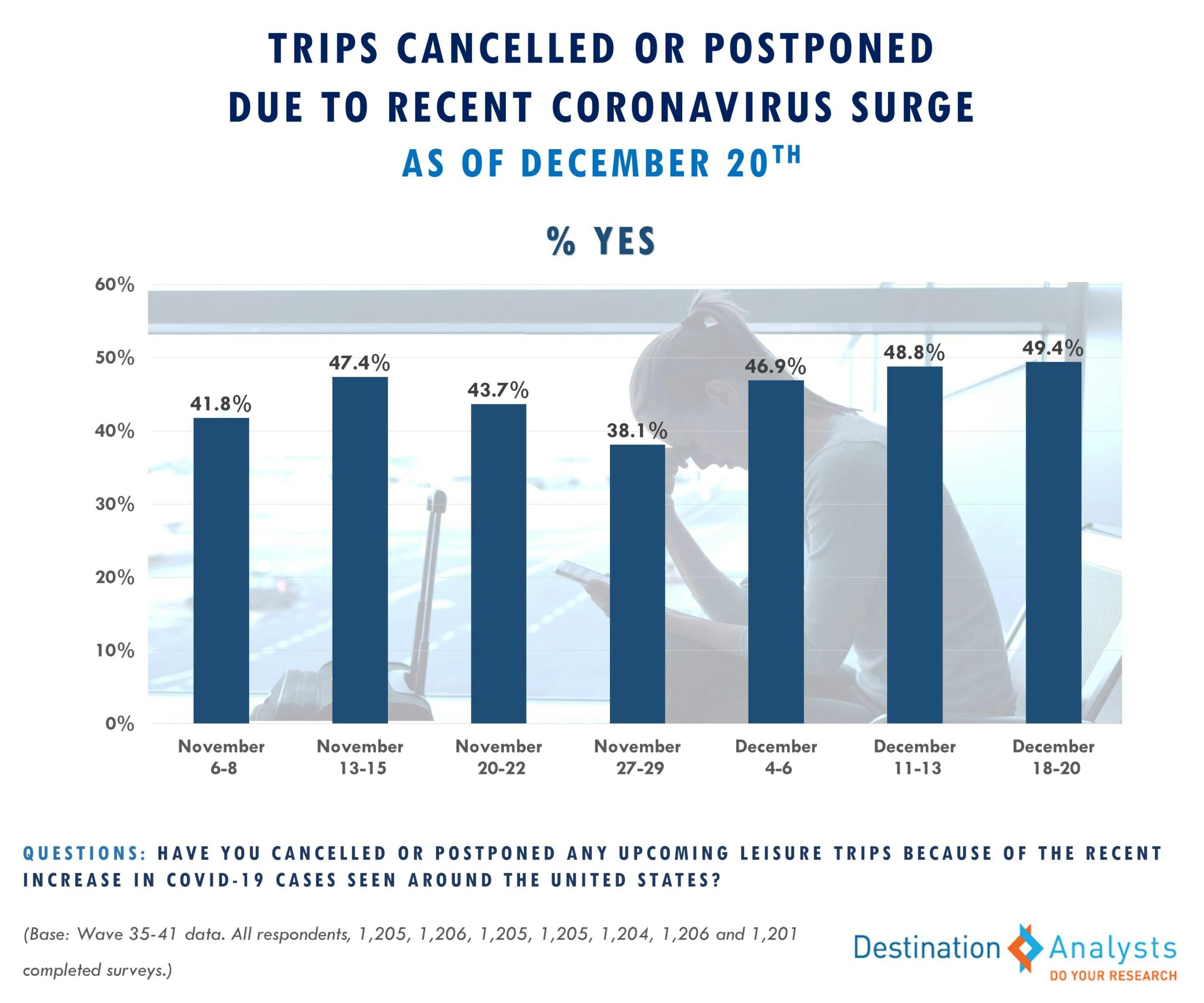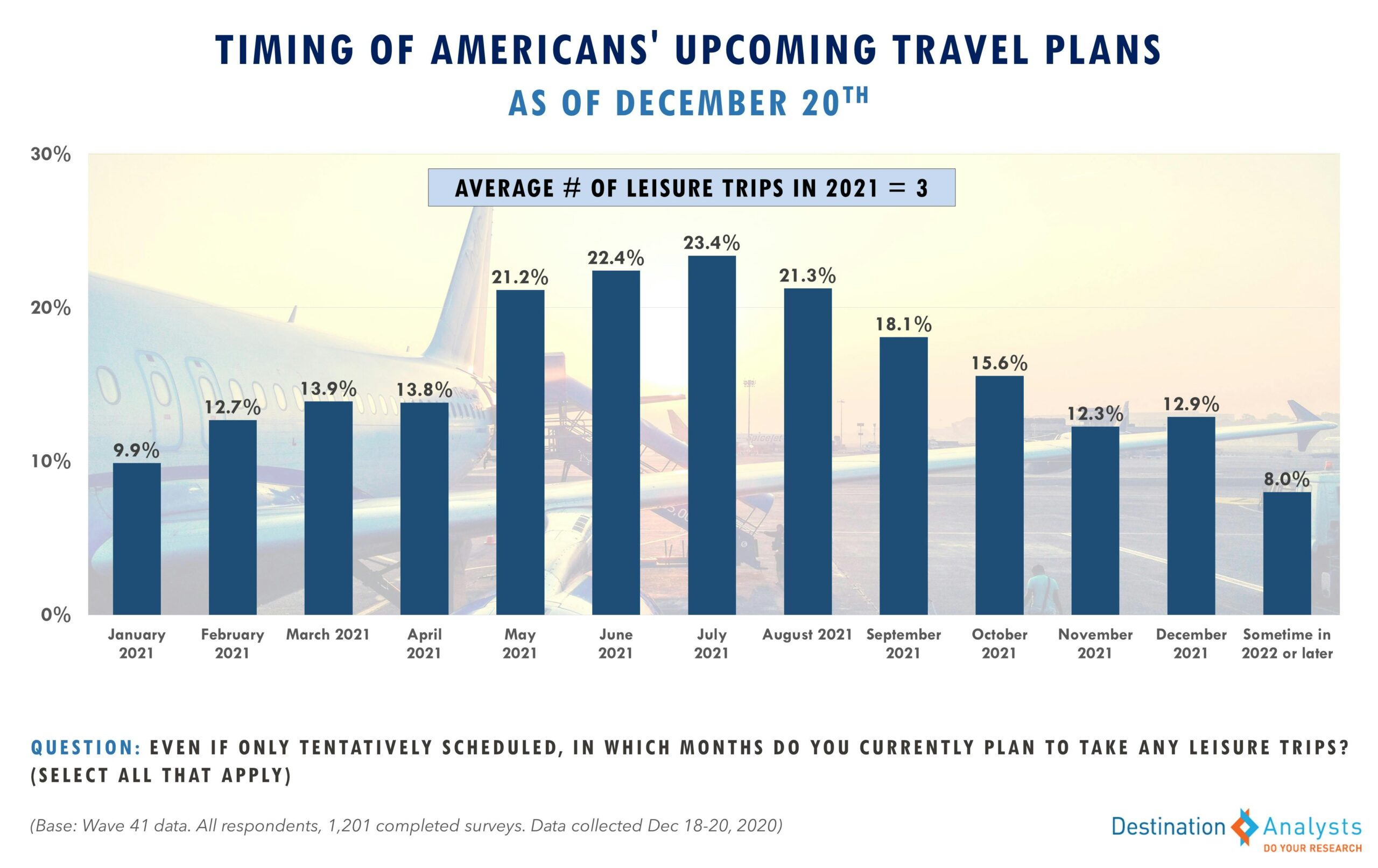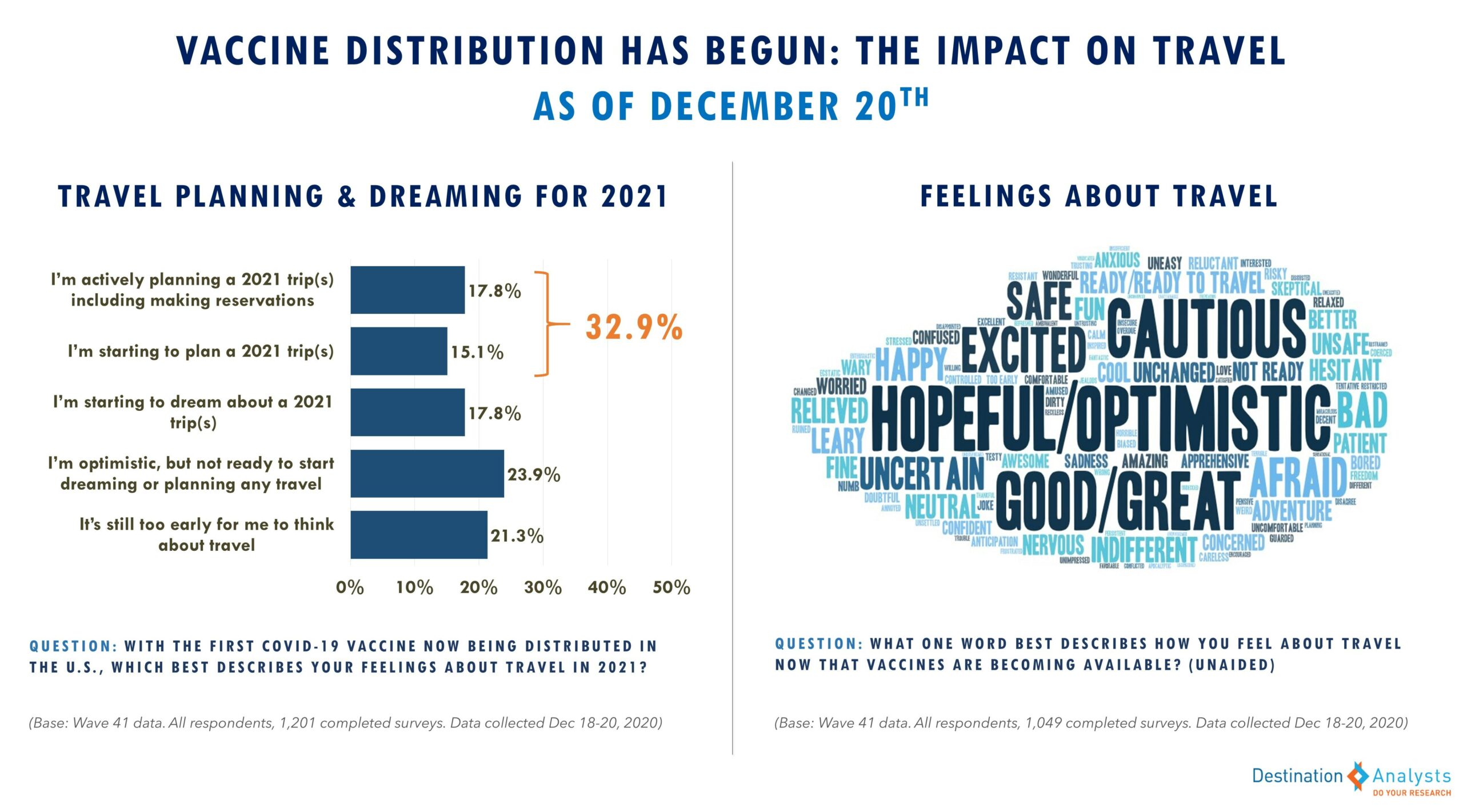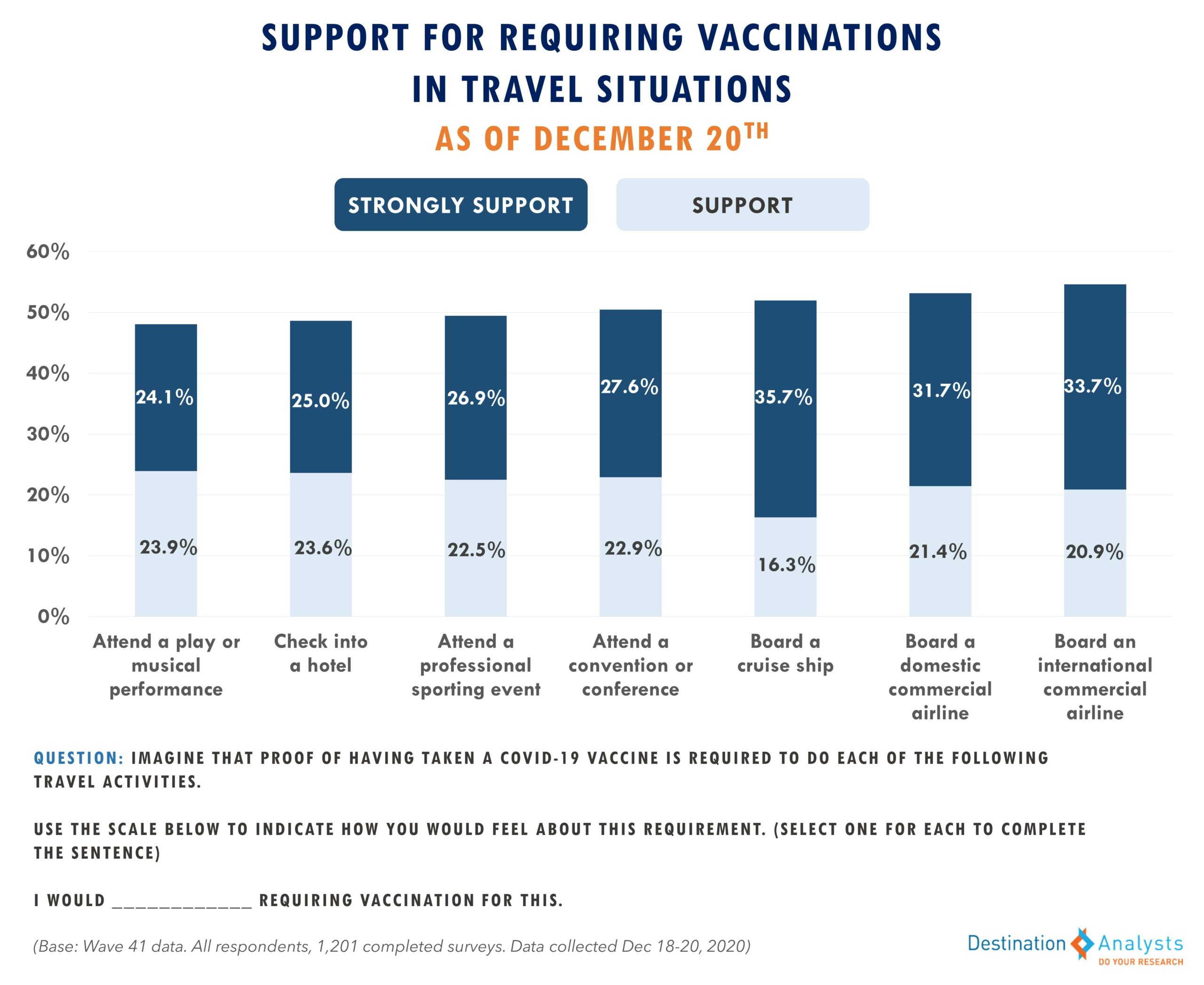IMPORTANT: These findings are brought to you from our independent research, which is not sponsored, conducted or influenced by any advertising or marketing agency. Every week since March 15th, Destination Analysts has surveyed 1,200+ American travelers about their thoughts, feelings, perceptions and behaviors surrounding travel in the wake of the coronavirus pandemic, and explored a variety of topics. The findings presented below represent data collected December 18th-20th.
Key Findings to Know:
- After a sustained period of skewing towards readiness between August and November, half of American travelers feel their mindset around travel right now is one of hesitation and delay. Only 41.9% feel confident they can travel safely right now, down from a high of 49.7% just two weeks ago.
- As AAA and other sources are also predicting, Christmas travel will be down significantly from 2019, when nearly one-third of American travelers took a Christmas holiday trip. This week, just 17.4% of American travelers say they will take a trip for the holiday, with 6.9% still unsure. Cancellations of a Christmas trip due to the pandemic were reported by 28.5%.
- For those who are traveling for Christmas, the average Christmas trip will be 4.6 days to a destination 597 miles away—although 56.7% will be under 500 miles.
- Thankfully, there was further progress on the vaccine front. National anxiety levels about contraction of the coronavirus and its impact on personal finances and the economy all dropped. Most notably, there was a 10-point drop in the percent of Americans who feel the coronavirus situation will get worse in the next month. Instead, nearly a third feel the situation will stay the same.
- The vaccine news appears to continue to have a positive influence on Americans’ travel sentiment for the future. The percent reporting an avoidance of international travel and conventions/conferences are both at 42-week lows, and openness to travel inspiration rebounded. American travelers are saying they will take an average of 3 leisure trips in 2021, with the May-August period the most common for travel.
- Americans are showing a growing agreement to take the vaccine.
- With the vaccine distribution timeline increasingly clear, 32.9% of Americans are now in the starting or actively planning a trip stage for 2021.
- However, the pandemic effects may linger for some time as Americans still express some travel hesitation, even with the vaccines. When asked to describe how they are going to approach getting back into travel in the period immediately after vaccines become widely available to the public, three quarters of American travelers say that they will get back carefully or test the waters first.
- There is the strongest support among American travelers for vaccine requirements for boarding flights and cruise ships.
As American travelers answered our survey questions this weekend, daily new coronavirus cases reached nearly a quarter million in the United States. Thus, after a sustained period of skewing towards readiness between August and November, half of American travelers feel their mindset around travel right now is one of hesitation and delay. Only 41.9% feel confident they can travel safely right now, down from a high of 49.7% just two weeks ago. Over half of American travelers continue to say they would feel guilty traveling now and fully 60.0% wouldn’t be able to fully enjoy it if they did. A majority feel traveling on a commercial airline is unsafe (57.5%), while 42.0% feel similarly about staying in a hotel and 49.9% believe staying in an AirBnB or home rental is also unsafe. Nearing half of American travelers (49.4%) report they have cancelled or postponed an upcoming trip specifically due this current surge in COVID cases. The greatest leap in cancellations and postponements caused by this increased outbreak occurred after the Thanksgiving holiday (when the percent jumped from 38.1% to 46.9%) but has incrementally grown each week since.

As AAA and other sources are also predicting, Christmas travel will be down significantly from 2019, when nearly one-third of American travelers took a Christmas holiday trip. This week, just 17.4% of American travelers say they will take a trip for the holiday, with 6.9% still unsure. Cancellations of a Christmas trip due to the pandemic were reported by 28.5%, and 45.3% say they have friends or family who would normally travel for the holiday but are not this year. For those who are traveling for Christmas, being with friends and family is, of course, the most common primary reason for their trip, but nearly half say they are also driven by taking a vacation/getaway. While staying in the homes of their friends and family is likeliest, hotels and other lodging will certainly see Christmas travelers. The average Christmas trip will be 4.6 days to a destination 597 miles away—although 56.7% will be under 500 miles.

Thankfully, there was further progress on the vaccine front. As Moderna’s vaccine was approved and healthcare workers across the U.S. began receiving the first doses, national anxiety levels about contraction of the coronavirus and its impact on personal finances and the economy all dropped. Most notably, there was a 10-point drop in the percent of Americans who feel the coronavirus situation will get worse in the next month. Instead, nearly a third feel the situation will stay the same.

The vaccine news appears to continue to have a positive influence on Americans’ travel sentiment for the future. The percent reporting an avoidance of international travel and conventions/conferences are both at 42-week lows (70.9% and 65.0%, respectively). Openness to travel inspiration rebounded to 5.4 on an 11-point scale after dipping to 4.9 three weeks ago. American travelers are saying they will take an average of 3 leisure trips in 2021. The May-August period looks to be the most common for travel; over 20% say they already have at least tentative trip plans in those months.

Looking more deeply into the impact of the COVID-19 vaccine on travel, 49.6% agree they are not traveling until vaccines are made widely available. Fortunately, Americans are showing a growing agreement to take the vaccine. This week, the majority (51.7%) say they will take one of the recently developed vaccines (up from 39.2% the week of November 7th), and 61.6% feel they are safe. With the vaccine distribution timeline increasingly clear, 32.9% of Americans are now in the starting or actively planning a trip stage for 2021. However, the pandemic effects may linger for some time as Americans still express some travel hesitation, even with the vaccines. When asked to describe how they are going to approach getting back into travel in the period immediately after vaccines become widely available to the public, three quarters of American travelers say that they will get back carefully (37.2%) or test the waters first (37.0%).

Now that the COVID-19 vaccine is here, new questions about vaccine requirements inevitably arise. There is the strongest support among American travelers for vaccine requirements for boarding flights and cruise ships. Although there is lesser agreement for vaccine requirements for conventions, hotel stays, sports and other live events, support among Americans right now approaches half.

For the complete set of findings, including historic data and custom information on your destination or business, purchase a subscription to The State of the American Traveler study.
Sign up for the next livestream below.
Have a travel-related question idea or topic you would like to suggest we study? Let us know!
We can help you with the insights your tourism strategy needs, from audience analysis to brand health to economic impact. Please check out our full set of market research and consulting services here.









